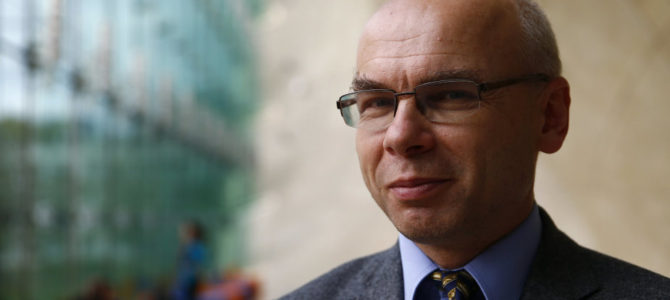15min.lt

Historian Dariusz Stola says there is a campaign underway in Poland to frighten historians who speak about Holocaust crimes committed by Poles. The result, he says, is invisible: books and articles which are never written. Stola says 10 years ago he was sure it would only get easier to talk about these complex historical events as time passed. Now something has changed, and it might be related to the growth of social media.
Stola is a professor of history at the Polish Academy of Sciences and served earlier as the director of Poland’s Jewish History Museum POLIN.
After five years directing POLIN Stola submitted an application to be rehired and received 11 of 15 votes by judges on the hiring commission, but the Polish minister of culture refused to appoint him director again.
We caught up with Stola a few days after a Polish court ordered two of the country’s leading historians to apologize to the niece of a village alderman who claimed Polish historians Barbara Engelking and Jan Grobowski libeled her relative in the monograph they coauthored where they wrote he was an accomplice in the mass murder of Jews.
Indirect Government Intervention
What does this court verdict mean for historical research in Poland?
The trial isn’t over yet, the historians have said publicly they will appeal the court’s finding. But even if it isn’t the final verdict, I’m afraid the case has already caused consequences. Very negative ones. Even the fact historians can be brought to trial for very limited comments.
The passage in dispute is just one paragraph in the book which is 1,700 pages long. It says one village elder in eastern Poland helped one Jewish woman survive the war but later possibly participated in the mass murder of a group of Jews.
This is a topic of discussion for Poland’s historians, it’s a complicated history in which you find good and evil.
The man’s relative brought the case, claiming libel because she thought that man was truly a hero who helped Jews during the war. But the court found itself in a very complicated position, non-historians had to decide what happened during the war. We still don’t have the court’s written finding, so I can’t comment, but we will examine it and assess how accurate the judge’s decision was.
To me, the most important aspect of this story is that a woman from a village in eastern Poland formally accused historians, but that backing her up was the organization League against Libel, which is close to Poland’s ruling party. The League’s director earlier advised the minister of culture and recently the organization has received large grants from the state.
Currently the League president is the chairman of the supervisory board of the Polish Press Agency.
This organization paid for the legal team and was the most important figure in this trial. What we have here is indirect government intervention.
Full interview in Lithuanian here.


